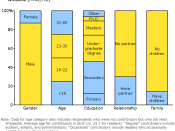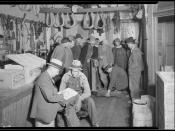Informal interviews are often useful. When the interviewer builds up rapport with the interviewee and the interviewee feels that they are not going to be criticised they will talk freely and honestly. This will discover the interviewee's meaning, values, attitudes and opinions. The researchers in Naming the Game spent 8 mounts building up a relationship with the girls before interviewing them. Dobash and Dobash spent time in women's refuges trying to establish rapport.
When rapport is established the information from the interviewee is more honest so this would add validity to the findings because they are telling the truth and you gain qualitative data. You can also discus more sensitive issues if the interviewee feels the interviewer is sympathetic and understanding.
However some sociologists prefer to take a more aggressive approach Backer suggested a bland polite style of conversation might develop in which little useful information is gained and that on occasions a more aggressive approach can provide a fuller picture.
He used this approach with the Chicago teachers.
Unstructured interviews are also useful for groups of people who are uncomfortable in the presence of people who they don't know. If the interviewer establishes rapport with the person then they will feel more comfortable to talk. Willis interviewed his lads in a group interview.
There are a lot of problems that can affect the usefulness of interviews such as interviewer bias the interviewer will affect the answers of the respondent and if people don't tell the truth then the data will not be valid. It is difficult to analysis the data collected from unstructured interviews because people give many different responses to questions asked so it is difficult to compare the data with other interviews. Most modern pieces of research use more than one method so the researcher can combine...

![milano - hotel marriott, 10.02.2009 [SW interview]](https://s.writework.com/uploads/4/47227/milano-hotel-marriott-10-02-2009-sw-interview-thumb.jpg)
